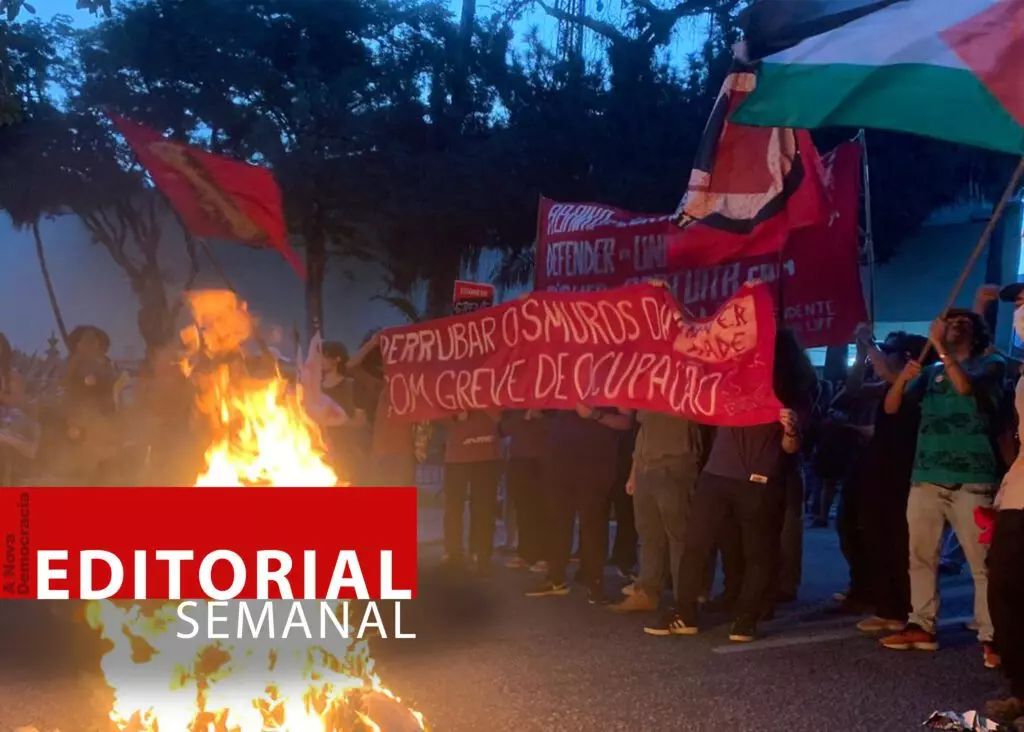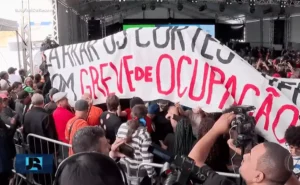
Brazil: AND Editorial –When words and practice devour each other
Hereby we publish an unofficial translation of the last Editorial published by A Nova Democracia.
There is no doubt that the popular masses must regain their rights through the force of their mobilization. Passive waiting for the promised “decrees”, “measures” and “reforms” from governments always results in no change, and in the strengthening, through frustration, of the far-right among the impoverished masses.
In an open letter, on May 23, the University Council of the Federal University of Rio de Janeiro (Consuni/UFRJ) asked the federal government for help to resolve structural problems and underfunding, in their words. There are 15 historic buildings, 19 museums, 43 libraries and 9 hospital units scrapped, some more than others, thanks to “drastic budget reductions started in 2013” – Dilma government – and that “unfortunately, until 2024, the budget situation remains unchanged” . Again: Consuni/UFRJ is the one saying it, unsuspected of being a Bolsonarist, refuting this easy accusation that has been usual in the government and PT members with their defensive attitude in the face of any criticism. These are the facts.
Meanwhile, on the 25th, during an event in Guarulhos, the president of the republic, when he was confronted by federal education workers – who struggle precisely against the scrapping of Education – said: “Never stop demanding, never bow your head and conform. Only with a lot of struggle can the people be heard in this Brazil.” Now, Mr. President: the executive branch is headed by you, you are the target of the protest; this is the most brazen way to “get rid off the bodies.” After all, who should the striking civil servants turn to in the struggle for readjustments and against scrapping? The cynicism here is such as to be contagious.
Luiz Inácio continued, as if to mock the strikers: “It’s great that you can come to a Lula rally and hold up a sign saying you’re on strike…”, he said. Certainly, education workers, sidelined by a government elected with glittering promises to redeem Education from scrapping, should be “grateful” for not being beaten. And that? “This government negotiates, knows how to deal with differences and contradictions”, said Luiz Inácio, as boasting. Because, for education workers, for example, it matters little whether the current government receives them with a “pat on the back” or a “spit on the ground”, if in both cases the result is the same: scrapping of Education, unfulfilled promises, supreme commitments with the financial oligarchy, the latifundium and with Mr. Arthur Lira. After all, why do they say elections took place in 2022?
This is where the shift manager’s words and actions destroy each other.
Meanwhile, the far right continues designing a replacement for Bolsonaro, one that unites the traditional right. Alexandre de Moraes, in an appeal trial by Bolsonaro’s defense, kept the captain of the bush ineligible along with his former vicepresident (Braga Neto). Bolsonaro had no doubt that the decision would be that: it was, in fact, a move to mobilize and cohesion his troops. Keeping it together and remaining active in public opinion are key issues for Bolsonaro, among other reasons, being able to transmit his votes to Tarcísio de Freitas, who tends to replace Bolsonaro. In turn, the press monopolies, in addition to giving lessons to Alexandre de Moraes through their editorials, in which he asks the STF for “prudence” and “an end to excesses”, are already giving wide repercussion to Tarcísio’s initiatives, even those who openly flirt with Bolsonarism, being its reports like the ones from a right-wing governor, even “hard-line”, but civilized. The most recent, the sanctioning of the law that regulates Civic-Military Schools – which will impose a true regime of exception to the masses of students and teachers fighting against the scrapping of state education – had national repercussions, as it was expected.
The tendency is, from now on, more and more political crises will open up, by initiative of the traditional right and the Bolsonarists, to wear down the current government and weaken it for 2026 – when the PT will no longer have the traditional right controlled, as this will migrate to compete as the more “well-behaved” Bolsonarist.
Now, the economic crisis remains persistent and, despite the disguises, it imposes itself: the interest rate on revolving credit cards reached 423.5% in April, according to data from the Central Bank (27/05), an increase of two points percentages compared to March; while, in the same month of April, the country recorded the highest monthly increase in requests for judicial recovery by companies since 2018 (184 requests), according to Serasa Experian.
There is no doubt that the popular masses must regain their rights through the force of their mobilization. Passive waiting for the promised “decrees”, “measures” and “reforms” from governments always results in no change, and in the strengthening, through frustration, of the extreme right among the impoverished masses. It is necessary to boost strike, demand and popular resistance movements, in the city and in the countryside, with new and larger land seizures; accumulating strength to build, step by step, emerging from the rubble of the old order, the new Brazil and the revolutionary government of New Democracy.

